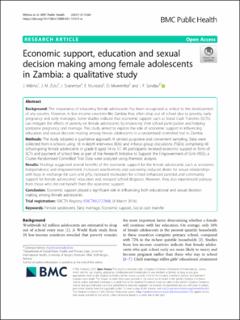Economic support, education and sexual decision making among female adolescents in Zambia: a qualitative study
Milimo, Joyce; Zulu, Joseph Mumba; Munsaka, Ecloss; Mweemba, Oliver; Sandøy, Ingvild Fossgard; Svanemyr, Joar
Journal article, Peer reviewed
Published version

Åpne
Permanent lenke
https://hdl.handle.net/11250/2838851Utgivelsesdato
2021Metadata
Vis full innførselSamlinger
Sammendrag
Background
The importance of educating female adolescents has been recognized as critical to the development of any country. However, in low income countries like Zambia they often drop out of school due to poverty, early pregnancy and early marriages. Some studies indicate that economic support such as Social Cash Transfers (SCTs) can mitigate the effects of poverty on female adolescents by improving their school participation and helping postpone pregnancy and marriage. This study aimed to explore the role of economic support in influencing education and sexual decision making among female adolescents in a randomised controlled trial in Zambia.
Methods
The study adopted a qualitative approach. It utilized purposive and convenient sampling. Data were collected from 6 schools using 18 in-depth interviews (IDIs) and 4 focus group discussions (FGDs) comprising 48 school-going female adolescents in grade 8 aged 14 to 17. All participants received economic support in form of SCTs and payment of school fees as part of the Research Initiative to Support the Empowerment of Girls (RISE), a Cluster Randomised Controlled Trial. Data were analyzed using thematic analysis.
Results
Findings suggested several benefits of the economic support for the female adolescents such as economic independence and empowerment; increased assertiveness and autonomy; reduced desire for sexual relationships with boys in exchange for cash and gifts; increased motivation for school; enhanced parental and community support for female adolescents’ education and; reduced school dropouts. However, they also experienced jealousy from those who did not benefit from the economic support.
Conclusion
Economic support played a significant role in influencing both educational and sexual decision making among female adolescents.
